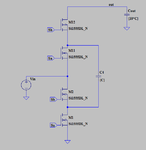bio_man
Full Member level 2
Hi folks,
I have four nMOS switches connected in Series with flying cap to boost input voltage to higher level ( circuit schematic attached). I am driving them using Arduino which has capability of 20mA/pin, my switches need only 5mA/switch, So I think I don't need a gate drive. The problem I am facing now how to shift the signals for upper switches (M2,M3,M4) because their sources are not in connected to ground. I thought of using bootstrap circuit but it seems the bootstrapping is applicable only with gate drivers and also needs isolated power supply. I thought of level shifters but really don't now how to implement them here??
Any hints?
Thanks alot
I have four nMOS switches connected in Series with flying cap to boost input voltage to higher level ( circuit schematic attached). I am driving them using Arduino which has capability of 20mA/pin, my switches need only 5mA/switch, So I think I don't need a gate drive. The problem I am facing now how to shift the signals for upper switches (M2,M3,M4) because their sources are not in connected to ground. I thought of using bootstrap circuit but it seems the bootstrapping is applicable only with gate drivers and also needs isolated power supply. I thought of level shifters but really don't now how to implement them here??
Any hints?
Thanks alot
